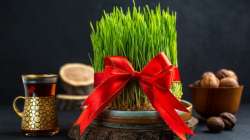Navroz 2023: Why do Parsis celebrate 2 New Years? Know details
For Parsis, Navroz is an annual reminder of who they are, what they believe in, and where they come from - all reasons why they choose to celebrate two new years.

In the Parsi culture, Navroz is a celebration of renewal and joy that marks the beginning of the Zoroastrian calendar year. Every year, Parsis around the world come together to celebrate the New Year and honour their rich heritage. But what makes Navroz so special? And why do Parsis celebrate two New Years?
Navroz is a celebration of renewal and hope. It represents a new start, a chance to reflect on the past year and set goals for the coming one. The Zoroastrian calendar, which dates back to over 3000 years ago, divides time into two distinct halves - one for each half of the sun’s movement in the sky. This means that although we celebrate Navroz around the same time every year (March 21st), it marks the beginning of a new year in one half of the sky while in the other half, it marks the end of a year. As such, Parsis celebrate two new years - one for each half of the sky.
According to the Zoroastrian calendar, the Parsi New Year which is also known as “Jamshedi Navroz" is celebrated on the first day of the Iranian month of Farvardin. However, according to the Shahenshahi or Kadmi calendar, the Shahenshahi New Year is celebrated around August or September every year. This year, it will be celebrated on August 16.
This tradition can be traced back to ancient times when Zoroastrianism was widely practised in Iran and Central Asia. Zoroastrianism was based on astrological beliefs and its followers paid close attention to the movements of the sun and moon. This is why Parsis celebrate two new years – to honour both halves of the sun's cycle.
On Navroz, Parsis also observe many other rituals and traditions. One such tradition is that of ‘fire worship’ which involves lighting an open flame in prayer to Ahura Mazda - the Supreme Being according to Zoroastrianism. This fire ritual is believed to bring good luck and prosperity to those who partake in it. Another tradition is that of ‘giving charity’ which involves donating money or items to charities or those in need. This act is believed to bring good fortune and success in business and other endeavours.
Navroz is also celebrated with feasts, parties and other festivities. Special dishes like ‘salad-e-Navroz’ (a traditional Persian salad) are prepared by Parsi families for their Navroz celebrations. Traditional music, dance and song are also common during these celebrations, as is exchanging gifts with family and friends.
Navroz brings people together from all walks of life to celebrate their culture and heritage. It's a time for reflection on life's ups and downs, setting intentions for the future, and enjoying time with loved ones. For Parsis, Navroz is an annual reminder of who they are, what they believe in, and where they come from - all reasons why they choose to celebrate two new years!